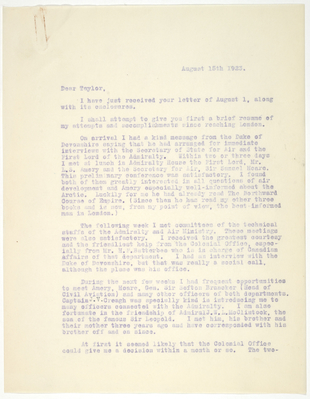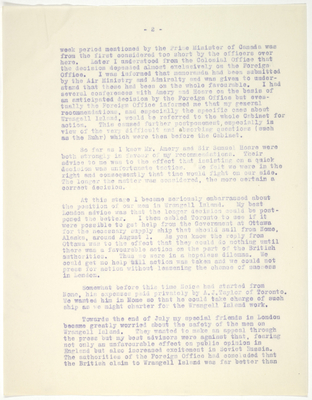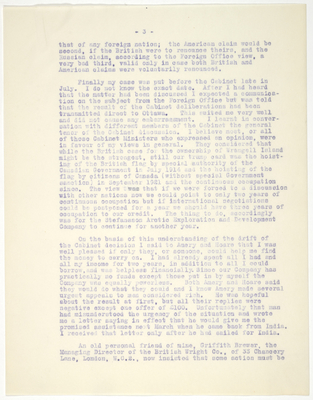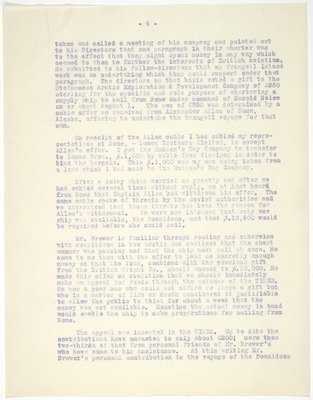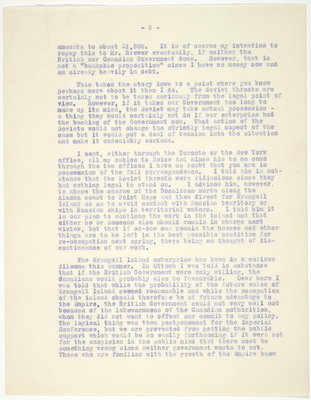Pages
stefansson-wrangel-09-12-119-001
.
Dear Taylor,
I have just received your letter of August 1, along with its enclosures.
I shall attempt to give you first a brief resume of my attempts and accomplishments since reaching London.
On arrival I had a kind message from the Duke of Devonshire saying that he had arranged for immediate interviews with the Secretary of State for Air and the First Lord of the Admiralty. Within two or three days I met at lunch in Admiralty House the First Lord, Mr. L.S. Amery and the Secretary for Air, Sir Samual Hoare. This preliminary conference was satisfactory. I found both of them greatly interested in all questions of air development and Amery especially well-informed about the Arctic. Luckily for me he had already read The Northward Course of Empire. (Since then he has read my other three books and is now, from my point of view, the best-informed man in London.)
The following week I met committees of the technical staffs of the Admiralty and Air Ministry. These meetings were also satisfactory. I received the greatest courtesy and the friendliest help from the Colonial Office, especially from Mr. H.F. Batterbee who is in charge of Canadian Affairs of that department. I had an interview with the Duke of Devonshire, but that was really a social call, although the place was his office.
During the next few weeks I had frequent opportunities to meet Amery, Hoare, Gen. Sir Sefton Brancker (Head of Civil Aviation) and many other officers of both departments. Captain J.V. Creagh was specially kind in introducing me to many officers connected with the Admiralty. I am also fortunate in the friendship of AdmiralJ.W.L. McClintock, the son of the famous Sir Leopold. I met him, his brother and their mother three years ago and have corresponded with his brother off and on since.
At first it seemed likely that the Colonial Office could give me a decision within a month or so. The two-
stefansson-wrangel-09-12-119-002
-2-
week period mentioned by the Prime Minister of Canada was from the first considered too short by the officers over here. Later I understood from the Colonial Office that the decision depended almost exclusively on the Foreign Office. I was informed that memoranda had been submitted by the Air Ministry and Admiralty and was given to understand that these had been on the whole favourable. I had several conferences with Amery and Hoare on the basis of an anticipated decision by the Foreign Office but eventually the Foreign Office informed me that my general recommendations, and especially the specific ones about Wrangell Island, would be referred to the whole Cabinet for action. This caused further postponement, especially in view of the very difficult and absorbing questions (such as the Ruhr) which were then before the Cabinet.
So far as I know Mr. Amery and Sir Samuel Hoare were both strongly in favour of my recommendations. Their advice to me was to the effect that insisting on a quick decision was unfortunate tactics. We felt we were in the right and consequently that time would fight on our side. The longer the matter was considered, the more certain a correct decision.
At this stage I became seriously embarrassed about the position of our men in Wrangell Island. My best London advice was that the longer decision could be postponed the better. I then cabled Toronto to see if it were possible to get help from the Government at Ottawa for the necessary supply ship that should sail from Nome, Alaska, around August 1. As you know the reply from Ottawa was to the effect that they could do nothing until there was a favourable action on the part of the British authorities. Thus we were in a hopeless dilemma. We could get no help till action was taken and we could not press for action without lessening the chance of success in London.
Somewhat before this time Noice had started from Nome, his expenses paid privately by A.J. Taylor of Toronto. We wanted him in Nome so that he could take charge of such ship as we might charter for the Wrangell Island work.
Towards the end of July my special friends in London became greatly worried about the safety of the men on Wrangell Island. They wanted to make an appeal through the press but my best advisors were against that, fearing not only an unfavourable effect on public opinion in England but also increased excitement in Soviet Russia. The authorities of the Foreign Office had concluded that the British claim to Wrangell Island was far better than
stefansson-wrangel-09-12-119-003
-3-
that of any foreign nation; the American claim would be second, if the British were to renounce theirs, and the Russian claim, according to the Foreign Office view, a very bad third, valid only in case both British and American claims were voluntarily renounced.
Finally my case was put before the Cabinet late in July. I do not know the exact date. After I had heard that the matter had been discussed I expected a communication on the subject from the Foreign Office but was told that the result of the Cabinet deliberations had been transmitted direct to Ottawa. This suited me very well and did not cause any embarrassment. I learnt in conversation with different members of the Cabinet the general tenor of the Cabinet discussion. I believe most, or all of those Cabinet Ministers who expressed an opinion, were in favour of my views in general. They considered that while the British case for the ownership of Wrangell Island might be the strongest, still our trump card was the hoisting of the British flag by special authority of the Canadian Government in July 1914 and the hoisting of the flag by citizens of Canada (without special Government sanction) in September 1921 and the continuous occupation since. The view was that if we were forced to a discussion with other nations now we could point to only two years of continuous occupation but if international negotiations could be postponed for a year we should have three years of occupation to our credit. The thing to do, accordingly was for the Stefansson Arctic Exploration and Development Company to continue for another year.
On the basis of this understanding of the drift of the Cabinet decision I said to Amery and Hoare that I was well pleased if only they, or someone, could help me find the money to carry on. I had already spent all I had and all my income for two years, in addition to all I could borrow, and was helpless financially. Since our Company has practically no funds except those put in by myself the Company was equally powerless. Both Amery and Hoare said they would do what they could and I know Amery made several urgent appeals to men considered rich. He was hopeful about the result at first, but all their replies were negative except one offer of £100. Unfortunately that man had misunderstood the urgency of the situation and wrote me a letter saying in effect that he would give me the promised assistance next March when he came back from India. I received that letter only after he had sailed for India.
An old personal friend of mine, Griffith Brewer, the Managing Director of the British Wright Co., of 33 Chancery Lane, London, W.C.2., now insisted that some action must be
stefansson-wrangel-09-12-119-004
-4-
taken and called a meeting of his company and pointed out to his Directors that one paragraph in their charter was to the effect that they might spend money in any way which seemed to them to further the interests of British aviation. He submitted to his fellow-directors that my Wrangell Island work was an undertaking which they could support under that paragraph. The directors on that basis voted a gift to the Stefansson Arctic Exploration & Development Company of £550 sterling for the specific and sole purpose of chartering a supply ship to sail from Nome under command of Harold Noice on or about August 1. The sum of £550 was determined by a cable offer we receieved from Alexander Allen of Nome, Alaska, offering to undertake the Wrangell voyage for that sum.
On receipt of the Allen cable I had cabled my representative at Nome, - Lomen Brothers Limited, to accept Allen's offer. I got the Hudson's Bay Company to transfer to Lomen Bros., $.1,000 by cable from Winnipeg in order to bind the bargain. This $.1,000 was my own money taken from a loan which I had made to the Hudson's Bay Company.
After a delay which worried us greatly and after we had cabled several times without reply, we at last heard from Nome that Captain Allen had withdrawn his offer. The same cable spoke of threats by the Soviet authorities and we understood that these threats had been the reason for Allen's withdrawal. We were now informed that only one ship was available, the Donaldson, and that $.12,600 would be required before she could sail.
Mr. Brewer is familiar through reading and otherwise with conditions in the Arctic and realised that the short summer was passing and that the ship must sail at once. He came to me then with the offer to lend me secretly enough money so that the loan, combined with the previous gift from the British Wright Co., should amount to $.10,000. He made this offer on condition that we should immediately make an appeal for funds through the columns of the TIMES. He was a poor man who could not afford so large a gift but who in a matter of life or death considered it justifiable to allow the public to think for about a week that the money was not available. Meantime the actual money in hand would enable the ship to make preparations for sailing from Nome.
The appeal was inserted in the TIMES. Up to date the contributions have amounted to only about £200; more than two-thirds of that from personal friends of Mr. Brewer's who have come to his assistance. At this writing Mr. Brewer's personal contribution to the voyage of the Donaldson
stefansson-wrangel-09-12-119-005
-5-
amounts to about £1,500. It is of course my intention to repay this to Mr. Brewer eventually, if neither the British nor Canadian Government does. However, that is not a "bankable proposition" since I have no money now and am already heavily in debt.
This takes the story down to a point where you know perhaps more about it than I do. The Soviet threats are certainly not to be take seriously from the legal point of view. However, if it takes our Government too long to make up its mind, the Soviet may take actual possession - a thing they would certainly not do if our enterprise had the backing of the Government now. That action of the Soviets would not change the strictly legal aspect of the case but it would put a deal of tension into the situation and make it undeniably serious.
I sent, either through the Toronto or the New York office, all my cables to Noice and since his to me came through the two offices I have no doubt that you are in possession of the full correspondence. I told him in substance that the Soviet threats were ridiculous since they had nothing legal to stand on. I advised him, however, to shape the course of the Donaldson north along the Alaska coast to Point Hope and then direct for Wrangell Island so as to avoid contact with Russian territory or with Russian ships in territorial waters. I told him it is our plan to continue the work in the island and that either he or someone else should remain in charge next winter, but that if no-one can remain the houses and other things are to be left in the best possible condition for re-occupation next spring, there being no thought of discontinuance of our work.
The Wrangell Island enterprise has been in a curious dilemma this summer. In Ottawa I was told in substance that if the British Government were only willing, the Canadians would probably also be favourable. Over here I was told that while the probability of the future value of Wrangell Island seemed reasonable and while the occupation of the island should therefore be of future advantage to the Empire, the British Government could not very well act because of the lukewarmness of the Canadian authorities, whom they did not want to offend nor commit to any policy. The logical thing was then postponement for the Imperial Conference, but we are prevented from getting the public support which would be so easily forthcoming if it were not for the suspicion in the public mind that there must be something wrong since neither government wants to act. Those who are familiar with the growth of the Empire know
